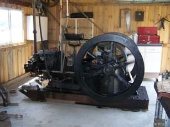
 4
4





 3
3




 3
3




 3
3




 3
3





 3
3




Ray Cover wrote:
I have seen tractor tires used for flower beds.
 3
3




 Sadly, this is even true of the Australian sites focussed on that country's famous "shed culture" - which, only a generation or two ago, was more agriculturally focussed. So many people with the necessary skills are oriented to frivolous distractions.
Sadly, this is even true of the Australian sites focussed on that country's famous "shed culture" - which, only a generation or two ago, was more agriculturally focussed. So many people with the necessary skills are oriented to frivolous distractions.
My online educational sites:
https://www.pinterest.ca/joelbc/homestead-methods-tools-equipment/
https://www.pinterest.ca/joelbc/mixed-shops/
 3
3










 3
3




My online educational sites:
https://www.pinterest.ca/joelbc/homestead-methods-tools-equipment/
https://www.pinterest.ca/joelbc/mixed-shops/






 2
2




My online educational sites:
https://www.pinterest.ca/joelbc/homestead-methods-tools-equipment/
https://www.pinterest.ca/joelbc/mixed-shops/
 2
2




Joel Russ wrote:If they can do it over there in India, Dale, I'm pretty sure we could do it here.
http://bizzbug.blogspot.ca/2013/03/rural-inventor.html
True, this is for tilled-land field cropping, and not all permies go in for that - but many homesteaders or small farmers do, and permies do too (under some circumstances).






 1
1




Dale Hodgins wrote:I hope that bike is belt driven. This could kill a transmission.
Dale Hodgins wrote:My tenant has given me an old alternator to use for harnessing a small amount of the hydro potential of my waterfall.
My online educational sites:
https://www.pinterest.ca/joelbc/homestead-methods-tools-equipment/
https://www.pinterest.ca/joelbc/mixed-shops/
 3
3




![Filename: handrail-and-deck.gif
Description: [Thumbnail for handrail-and-deck.gif]](/t/12321/a/22575/handrail-and-deck.gif)
 1
1










 4
4




My online educational sites:
https://www.pinterest.ca/joelbc/homestead-methods-tools-equipment/
https://www.pinterest.ca/joelbc/mixed-shops/






 1
1




My online educational sites:
https://www.pinterest.ca/joelbc/homestead-methods-tools-equipment/
https://www.pinterest.ca/joelbc/mixed-shops/
 3
3




 3
3




Mike Hamilton wrote:Snow blower's
up here in northern Michigan there is an abundance of used/broken/dead snow blowers.
 4
4










 1
1




Dale Hodgins wrote:Some walk-behind snowblowers, have a powerful self drive gear. After the snow blowing equipment is ripped off, it would be fairly easy to attach a small stone boat and strap. We now have a skidder, suitable for small logs. The weight of the log can help with traction.
My online educational sites:
https://www.pinterest.ca/joelbc/homestead-methods-tools-equipment/
https://www.pinterest.ca/joelbc/mixed-shops/
 1
1










 1
1




My online educational sites:
https://www.pinterest.ca/joelbc/homestead-methods-tools-equipment/
https://www.pinterest.ca/joelbc/mixed-shops/






 2
2




My online educational sites:
https://www.pinterest.ca/joelbc/homestead-methods-tools-equipment/
https://www.pinterest.ca/joelbc/mixed-shops/

|
Straws are for suckers. Now suck on this tiny ad!
Homestead Pigs Course
https://permies.com/wiki/365748/Homestead-Pigs
|





